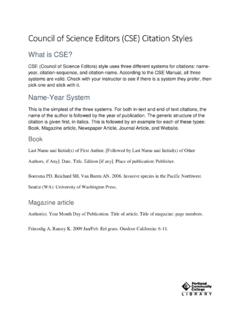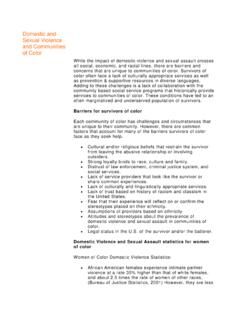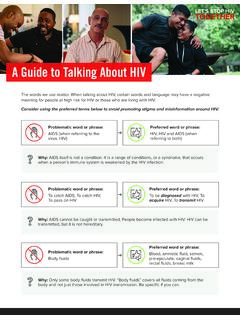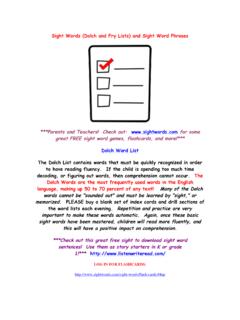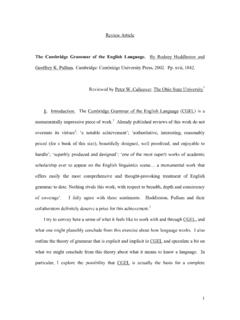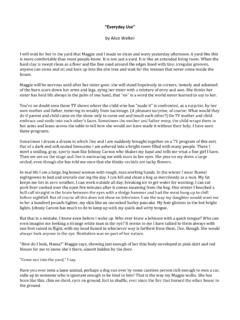Transcription of White Privilege: Unpacking the Invisible Knapsack
1 Tri-County Domestic & Sexual Violence Intervention Network Anti-Oppression Training for Trainers Created by Carol Cheney, Jeannie LaFrance and Terrie Quinteros, 2006. ext. 2. White Privilege: Unpacking the Invisible Knapsack Privilege: an Invisible package of unearned assetsthat I can count on cashing in each day,but about which I was meant to remain McIntosh Through work to bring materials from women sstudies into the rest of the curriculum, I have often noticed men s unwillingness to grant that they are overprivileged, even though they may grant that women are disadvantaged. They may say they will work to improve women s status, in the society, the university, or the curriculum, but they can t or won t support the idea of lessening men s.
2 Denials that amount to taboos surround the subject of advantages that men gain from women s disadvantages. These denials protect male privilege from being fully acknowledged, lessened, or ended. Thinking through unacknowledged male privilege as a phenomenon, I realized that, since hierarchies in our society are interlocking, there was most likely a phenomenon of White privilege that was similarly denied and a White person, I realized I had been taught about racism as something that puts others at a disadvantage, but had been taught not to see one of its corollary aspects, White privilege, which puts me at an advantage.
3 I think whites are carefully taughtnot to recognize White privilege, as males are taught not to recognize male privilege. So I have begun in an untutored way to ask what it is like to have White privilege. I have come to see White privilege as an Invisible package of unearned assets that Ican count on cashing in each day, but about which I was meant to remain oblivious. White privilege is like an Invisible weightless Knapsack of special provisions, maps, passports, codebooks, visas, clothes, tools, and blank checks. Describing White privilege makes one newly accountable. As we in women s studies work to reveal male privilege and ask men to give up some of their power, so one who writes about having White privilege must ask, Having described it, what will I do to lessen or end it?
4 AfterI realized the extent to which men work from a base of unacknowledged privilege, I understood that much of their oppressiveness was unconscious. Then I remembered the frequent charges from women of color that White women whom they encounter are oppressive. I began to understand why we are justly seen as oppressive, even when we don t see ourselves that way. I began to count the ways in which I enjoy unearned skin privilege and have been conditioned into oblivion about its existence. My schooling gave me no training in seeing myself as an oppressor, as an unfairly advantaged person, or as a participant in a damaged culture.
5 I was taught to see myself as an individual whose moral state depended on her individual moral will. My schooling followed the patternmy colleague Elizabeth Minnich has pointed out: whites are taught to think ofTri-County Domestic & Sexual Violence Intervention Network Anti-Oppression Training for Trainers Created by Carol Cheney, Jeannie LaFrance and Terrie Quinteros, 2006. ext. 2. their lives as morally neutral, normative, and average, and also ideal, so that when we work to benefit others, this is seen as work that will allow them to be more like us. Daily Effects of White Privilege I decided to try to work on myself at least by identifying some of the daily effects of White privilege in my life.
6 I have chosen those conditions that I think in my caseattach somewhat more to skin-color privilegethanto class, religion, ethnic status, or geographic location, though of course all these other factors are intricately intertwined. As far as I can tell, my African American coworkers, friends, and acquaintances with whom I come into daily or frequent contactin this particular time, place, and line of work cannot count on most of these conditions. 1. I can, if I wish, arrange to be in the company of people of my race most of the time. 2. If I should need to move, I can be pretty sure of renting or purchasing housing in an area that I can afford and in which I would want to live.
7 3. I can be pretty sure that my neighbors in such a location will be neutral or pleasant to me. 4. I can go shopping alone most of the time, pretty well assured that I will not be followed or harassed. 5. I can turn on the television or open to the front page of the paper and see people of my race widely represented. 6. When I am told about our national heritage or about civilization, I am shown that people of my color made it what it is. 7. I can be sure that my children will be given curricular materials that testify to the existence of their race. 8. If I want to, I can be pretty sure of finding a publisher for this piece on White privilege.
8 9. I can go into a music shop and count on finding the music of myrace represented, into a supermarket and find the staple foods that fit with my cultural traditions, into a hairdresser s shop and find someone who can deal with my hair. 10. Whether I use checks, credit cards, or cash, I can count on my skin color not to work against the appearance of financial reliability. 11. I can arrange to protect my children most of the time from people who might not like them. 12. I can swear, or dress in second-hand clothes, or not answer letters without having people attribute these choices to the bad morals, the poverty, or the illiteracy of my race.
9 13. I can speak in public to a powerful male group without putting my race on trial. 14. I can do well in a challenging situation without being called a credit to my race. 15. I am never asked to speak for all the people of my racial group. 16. I can remain oblivious of the language and customs of persons of color, who constitute the world s majority, without feeling in my culture any penalty for such Domestic & Sexual Violence Intervention Network Anti-Oppression Training for Trainers Created by Carol Cheney, Jeannie LaFrance and Terrie Quinteros, 2006. ext. 2. 17. I can criticize our government and talk about how much I fear its policies and behavior without being seen as a cultural outsider.
10 18. I can be pretty sure that if I ask to talk to the person in charge I will be facing a person of my race. 19. If a traffic cop pulls me over, or if the IRS audits my tax return, Ican be sure I haven t been singled out because of my race. 20. I can easily buy posters, postcards, picture books, greeting cards, dolls, toys, and children s magazines featuring people of my race. 21. I can go home from most meetings of organizations I belong tofeeling somewhat tied in rather than isolated, out of place, outnumbered, unheard, held at a distance, or feared. 22. I can take a job with an affirmative action employer without having coworkers on the job suspect that I got it because of race.




